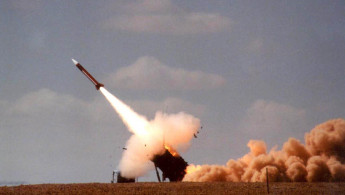Saudi Arabia receives Patriot missiles from the US to fend off Houthi attacks
The US has transferred several Patriot missile batteries to Saudi Arabia over the past few weeks to protect the kingdom from Houthi attacks, according to reports.
The move comes after tensions between the two countries with US officials telling Al Jazeera that the transfer of the interceptors was in-line with US President Joe Biden's vow to "have the backs of our friends in the region".
After refusing to condemn Russia and helping oil prices spike, the U.S. rewards Saudi Arabia with Patriot anti missile receptors
— Samuel Ramani (@SamRamani2) March 21, 2022
The weapons transfer comes after Washington piled pressure on Riyadh to raise its oil supplies following record prices at pumps, in part, due to Russia's invasion of Ukraine.
For months, Saudi Arabia has asked for the interceptors to fend off attacks by Yemen's Iran-aligned Houthi rebels who have launched multiple drone and missile strikes on cities and infrastructure in the kingdom.
Saudi Arabia said on Monday that Houthi attacks are a "direct threat to the security of oil supplies in these extremely sensitive circumstances witnessed by the global energy markets", as reported by Al Jazeera.
The kingdom is not responsible for an oil shortage because of Houthi attacks, it added.
The Houthis have repeatedly struck oil facilities and other targets in Saudi Arabia.
Satellite images revealed that the Houthis recently hit an oil storage tank in Jeddah for a second time, two years after they struck the site in November 2020, as reported on Tuesday by the Associated Press.
Officials said that the Yemeni rebels had launched four attacks inside the kingdom on Sunday, causing damage to cars and homes.
The Saudi-led war against the Houthis in Yemen has dragged on for seven years, devastating a country already struggling with poverty and insecurity.
The fighting has killed more than 150,000 people, according the UN, as Yemenis struggle for basic necessities such as food, water, and medicine.





 Follow the Middle East's top stories in English at The New Arab on Google News
Follow the Middle East's top stories in English at The New Arab on Google News
![The UAE is widely suspected of arming the RSF militia [Getty]](/sites/default/files/styles/image_330x185/public/2024-11/GettyImages-472529908.jpg?h=69f2b9d0&itok=Yauw3YTG)
![Netanyahu furiously denounced the ICC [Getty]](/sites/default/files/styles/image_330x185/public/2024-11/GettyImages-2169352575.jpg?h=199d8c1f&itok=-vRiruf5)
![Both Hamas and the Palestinian Authority welcomed the ICC arrest warrants [Getty]](/sites/default/files/styles/image_330x185/public/2024-11/GettyImages-2178351173.jpg?h=199d8c1f&itok=TV858iVg)